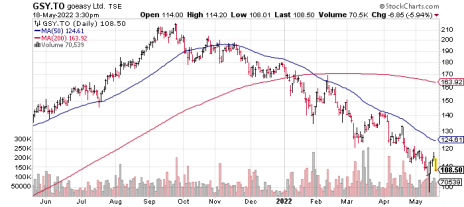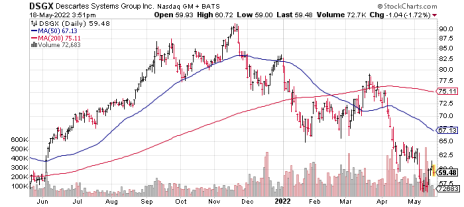One of the fun activities that comes with being a small-cap stock analyst is searching for new stocks to cover for subscribers to Cabot Small-Cap Confidential. I’m not limited to certain sectors or geographies; I can cover Canadian small-cap stocks, U.S.-listed small caps or European small caps. If a company looks good, it’s fair game!
I’ll often turn to the Canadian stock exchanges to see what’s going on just north of the border. When looking in Canada, investors can lump stocks into one of two large buckets.
The first bucket is the Vancouver Stock Exchange. These stocks usually have market caps under $250 million and often trade for less than a dollar. You’ll find a lot of mining and oil and gas stocks in Vancouver, but some technology stocks too. For investors looking to narrow this universe down a little more they can start with the Venture 50 list.
[text_ad]
The Venture 50 list is published at the beginning of every year by the TSX Venture Exchange. It covers the exchange’s 50 best-performing stocks over the last calendar year based on three equally weighted criteria: market cap growth, share price appreciation and trading volume amount. Additionally, each company must have a market cap of over $5 million and a share price greater than $0.25.
The second bucket is the Toronto Stock Exchange. These are comparatively more established companies and there is a wider selection of stocks to choose from. Some companies go public directly on the Toronto Stock Exchange, while others uplist from Vancouver once they satisfy the listing requirements.
There are more than a few Canadian small-cap stocks worthy of your attention right now. Here are two I think look particularly compelling right now.
These 2 Canadian Small-Cap Stocks Are Looking Undervalued
Canadian Small-Cap Stock #1: goeasy (GSY.TO, EHMEF)
Note: All prices stated below are in Canadian dollars (CAD$), unless otherwise noted.
Canadians looking for alternative, non-prime financing solutions, or a little help leasing furniture, appliances or consumer electronics, can turn to one small cap Canadian stock that has been delivering handsome returns to shareholders for years. It’s called goeasy (GSY.TO, EHMEF).
The pitch is that it is a “… leading full-service provider of goods and alternative financial services that provides everyday Canadians with a chance for a better tomorrow, today.”
Why wait, when you can live better right now?!
The $1.7 billion market cap, Ontario-based company was founded in 1990. Revenue has grown every year since 2001 and has been up double digits every year since 2013, with the exception of 2020 (thanks, pandemic).
In the early years goeasy’s growth came from its first division, easyhome. Easyhome is Canada’s largest lease-to-own company and helps customers acquire brand-name household furniture, appliances and electronics from both corporate and franchise stores, and pay for them under weekly or monthly leasing agreements.
Revenue in the easyhome segment came in at $37.5 million in Q1, which was reported earlier this month. To be clear, the fixed annual interest rate is far from cheap at 29.99%. I guess that’s what unsecured, non-prime borrowers pay these days. (My inner voice is screaming for these clients to just say “NO” to financing that comfy couch – go get a cheap used one you can afford!)
Growth in the easyhome segment hit a brick wall in 2009 and 2010 during the financial crisis when revenue topped out at around $170 million. The segment has shrunk since, and 2020 wasn’t the best of years due to the pandemic. But this segment is stable and operating margins are attractive.
The real growth engine is a newer segment, which is in the earlier stages of growth. The company moved quickly during the financial crisis and launched its second segment, easyfinancial, a non-prime consumer lending company that bridges the all-too-massive gap between traditional lenders and predatory payday lenders.
Financing options include secured or unsecured installment loans ranging from $500 to $45,000, with interest rates starting at 19.99%. Repayment terms are nine to 60 months for unsecured loans, and up to 10 years for secure loans.
The easyfinancial segment has been expanding and offers an omni-channel model so customers can complete transactions through a national branch network of 266 locations, online through a digital application platform, or through call centers. The company’s investor relations materials tout the quality of goeasy’s risk analytics technology, which helps avoid bad loans and facilitates loan offerings at the point of sale through third-party merchants. In 2021, revenue in this segment hit $676 million (up 32% over 2020) on gross consumer loans of $2 billion (with $1.5 billion originated in fiscal 2021).
The bottom line is that sales in the easyfinancial segment have soared in recent years while sales in the easyhome segment have declined. All in, revenue in 2021 of $827 million was up 26.6%, while adjusted EPS of $10.43 was up 37.8%. These numbers don’t fully price in last year’s acquisition of LendCare, a point-of-care/point-of-sales lender that’s expected to contribute to growth in the years ahead. Goeasy pays a dividend with a forward yield of 3.11%.
The stock has been a relatively steadfast performer, albeit with the normal pullbacks and consolidation periods over the years. The most dramatic retreat was during the pandemic (no surprise) when shares fell a demoralizing 74% from their pre-pandemic high of 80.6. However, the stock climbed back steadily and hit new all-time highs in September. The stock then corrected lower through the end of the year and is working on establishing a bottom. Given the strong fundamentals and valuation (PE of 8), this is one to watch for a technical turnaround.
Canadian Small-Cap Stock #2: Descartes Systems (DSGX)
Note: All prices stated below are in U.S. Dollars, unless otherwise noted.
It’s hard to argue against a stock that’s performed as well as Descartes Systems (DSGX) over the last decade, especially given that the company still has a market cap of just $5 billion. Sure, there have been some choppy periods here and there. But most dips in the stock have attracted buyers who seem all too eager to snatch up shares of the Ontario-based logistics management software company.
The big-picture trend powering the stock is demand for supply chain software solutions. That demand stems from increasing complexity in global trade networks that are often disrupted, which slows down delivery time. Descartes helps customers overcome these challenges by offering faster deliveries to market by using a proprietary logistics data and analytics platform that automates and optimizes otherwise inefficient global logistics processes.
Products range from connectivity and document exchange, route planning and inventory and asset visibility, to wireless dispatch, rate management and warehouse optimization. These solutions help customers manage the flow of data and documents that track and control inventory, assets and people in motion, whether they interact with high- or low-tech partners.
In short, customers come to Descartes because they face immense logistics challenges, and the company can plug them in to the world’s largest multi-modal logistics network. They stay because Descartes gets the job done and offers partners and solutions that help clients differentiate themselves from the competition.
Revenue has been up double digits in 13 of the last 14 years, including up 16% (to $275 million) in 2019 and 18% (to $326 million) in 2020 but came in at just a 7% growth rate in 2021. Adjusted EPS has been positive since 2006 and has been up double digits every year since 2015, including up 14% (to $0.40) in 2019, 12% (to $0.45) in 2020, and 36% (to $0.61) for 2021.
Descartes’ stock has a tendency to trade above its 50-day line on a weekly chart. Pullbacks to that moving average line are typically in the -7% to -15% range. The rare correction is typically in the -20% to -30% range, and there have been fewer than 10 of these since 2013. The biggest by far was during the pandemic, when DSGX fell 50% from an all-time high of 47.4.
The stock rebounded quickly and broke out to new highs in June 2020. Since then, DSGX moved steadily higher, putting in a fresh all-time high in November before correcting with broader markets. The stock (like everything else) is choppily trending lower and looking for a bottom at levels last seen in May of 2021. Longer term, I expect strong performance from DSGX.
As always, if you’re interested in getting my research on the best small caps in the world, start your subscription to Cabot Small-Cap Confidential by clicking here now.
[author_ad]
*This post has been updated from an original version, published in 2019.



